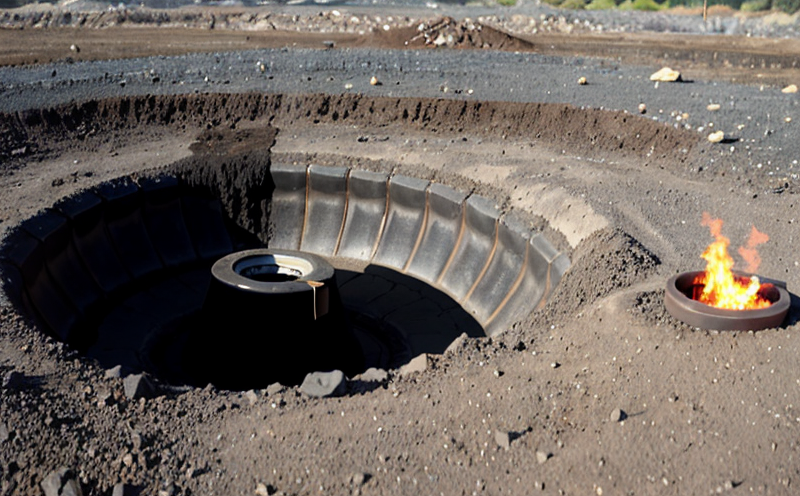DIN 51723 Gross Calorific Value of Coal Testing
The DIN 51723 standard specifies a method to determine the gross calorific value (GCV) of coal, which is crucial for assessing the energy content and quality of various types of coal. This test provides insights into the heating potential of coal by measuring its combustion heat. The GCV is an important parameter in the mining sector as it influences the pricing of coal on global markets.
The testing procedure outlined in DIN 51723 involves several steps, including sample preparation and conditioning. Samples must be homogeneous and representative of the coal being tested. This may involve crushing large pieces into smaller fragments to ensure uniformity. The prepared samples are then ignited under controlled conditions, typically in a bomb calorimeter, where their combustion is measured accurately.
The accuracy of this test can vary depending on several factors including sample preparation, environmental conditions during testing, and the precision of the instruments used. It's essential that laboratories adhering to DIN 51723 maintain strict adherence to protocol to ensure reliable results. The use of state-of-the-art calorimeters is recommended for high accuracy.
The test results help in optimizing coal utilization processes by providing data on the heating value, which can be used for efficient boiler management and energy planning. Additionally, it aids in regulatory compliance, ensuring that the coal meets specified standards set forth by international bodies such as ISO, ASTM, and EN.
Understanding the GCV is vital not only for quality control but also for environmental considerations. By knowing the calorific value of coal, operators can minimize waste and maximize efficiency in production processes. This knowledge is critical for industries ranging from power generation to metallurgy.
The DIN 51723 standard has been widely adopted across Europe and beyond due to its reliability and precision. Its use ensures consistency and comparability of test results, facilitating smoother international trade in coal products.
Why Choose This Test
- Precision and Reliability: DIN 51723 provides a standardized method for determining the gross calorific value of coal, ensuring consistent and reliable results.
- Regulatory Compliance: Adherence to this standard helps mining companies comply with international regulations governing coal quality.
- Market Advantage: Knowing the exact calorific value can give a competitive edge in negotiating prices or meeting client specifications.
- Precision Measurement: The test ensures accurate measurement of heating potential, critical for optimizing processes and reducing waste.
The precision and reliability provided by DIN 51723 make it an indispensable tool for quality managers, compliance officers, R&D engineers, and procurement teams. By choosing this test, these professionals can ensure that their coal products meet the highest standards of quality and efficiency.
International Acceptance and Recognition
The DIN 51723 standard for gross calorific value has gained significant acceptance internationally due to its rigorous methodology and consistent results. This standard is widely used in Europe, but it also enjoys recognition globally as a reliable method for coal testing.
Many countries have adopted or adapted the DIN 51723 protocol to their own national standards, recognizing its importance in ensuring uniform quality across different markets. The use of this standard fosters trust and reliability among trading partners, making it easier for miners to export their products worldwide.
The acceptance of DIN 51723 is not limited to the coal industry but extends to related sectors such as power generation and metallurgy. By adhering to this standard, these industries can ensure that they are using the most accurate method available for determining the calorific value of coal.
The widespread adoption of DIN 51723 reflects its utility in addressing global challenges such as energy efficiency and environmental sustainability. Its use helps in optimizing resource utilization while minimizing carbon emissions.
Competitive Advantage and Market Impact
- Informed Decision-Making: Accurate calorific value assessment allows for better resource allocation and production planning.
- Enhanced Reputation: Compliance with international standards enhances the reputation of mining companies, attracting more clients.
- Precise Negotiation: Knowing exact calorific values enables more precise negotiations in coal trading.
- Innovation Facilitation: Reliable data from DIN 51723 supports R&D efforts aimed at improving coal utilization and conversion technologies.
The use of DIN 51723 not only ensures compliance with international standards but also provides a competitive edge in the market. By offering precise, reliable testing results, mining companies can differentiate themselves from competitors and secure better business opportunities.





